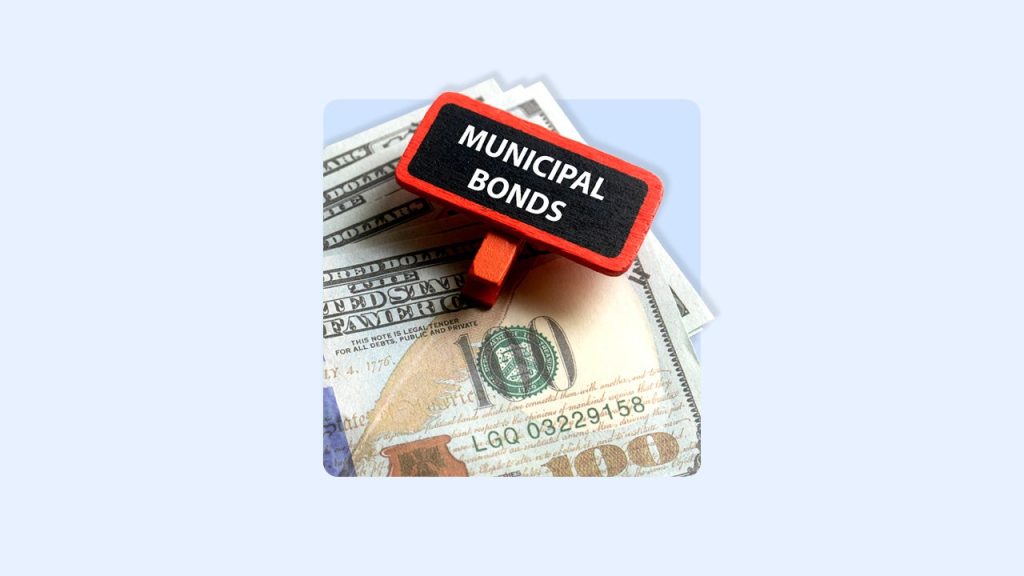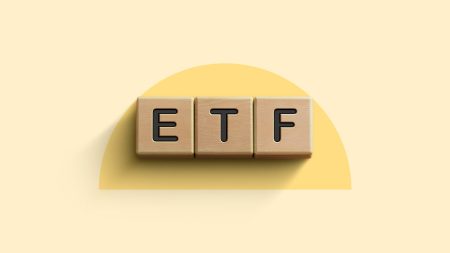Mohamad Faizal Bin Ramli/ Getty Images; Illustration by Austin Courregé/Bankrate
While stocks get most of the attention in the investment world, municipal bonds can play an important role in a diversified portfolio and may come with attractive tax advantages. Municipal bonds, or munis, are issued by state and local governments to fund various government projects. Unlike most bonds, they are typically exempt from federal income tax, making them an attractive choice for investors in high tax brackets.
Here’s what else you need to know about municipal bonds, as well as some top funds to consider for your portfolio.
Top municipal bond funds
Data as of June 6, 2025.
Vanguard Tax-Exempt Bond ETF (VTEB)
The Vanguard Tax-Exempt Bond ETF is an index fund that seeks to track the performance of a benchmark measuring the investment-grade U.S. municipal bond market. At least 80 percent of the fund’s assets are invested in securities whose income is exempt from federal income tax.
- 5-year annualized return: 0.43 percent
- Yield: 3.90 percent
- Expense ratio: 0.03 percent
- Total assets: $38.1 billion
Fidelity Tax-Free Bond Fund (FTABX)
The Fidelity Tax-Free Bond Fund aims to provide a high current yield that is exempt from federal income tax. The fund typically invests at least 80 percent of its assets in investment-grade securities whose interest is exempt from federal income tax. The fund may engage in transactions that have a leveraging effect on the fund, which magnifies gains and losses.
- 5-year annualized return: 1.03 percent
- Yield: 3.88 percent
- Expense ratio: 0.25 percent
- Total assets: $3.3 billion
T. Rowe Price Tax-Free High Yield Fund (PRFHX)
The T. Rowe Price Tax-Free High Yield Fund seeks a high level of income that is exempt from federal income tax by investing in long-term municipal securities with a low to upper-medium investment grade. The fund invests a substantial portion of its assets in municipal “junk” bonds and may purchase bonds in default as long as they don’t account for more than 10 percent of assets.
- 5-year annualized return: 2.05 percent
- Yield: 4.04 percent
- Expense ratio: 0.63 percent
- Total assets: $3.2 billion
BlackRock Allocation Target Shares: Series E Fund (BATEX)
This BlackRock fund aims to provide investors with higher federal tax-free income than other muni bond funds that invest in investment-grade securities by buying both investment-grade and non-investment-grade municipal bonds. About half of the fund is invested in municipal “junk” bonds and up to 10 percent of assets can be invested in distressed securities.
- 5-year annualized return: 3.37 percent
- Yield: 5.35 percent
- Expense ratio: 0.11 percent
- Total assets: $482.5 million
Macquarie National High-Yield Municipal Bond Fund Institutional Class (DVHIX)
The Macquarie National High-Yield Municipal Bond Fund invests in medium and lower-grade municipal bonds to generate a high level of current income that is exempt from federal income tax. The fund currently holds debt from places such as Puerto Rico and California.
- 5-year annualized return: 2.46 percent
- Yield: 5.04 percent
- Expense ratio: 0.60 percent
- Total assets: $3.4 billion
Vanguard High-Yield Tax-Exempt Fund Admiral Shares (VWALX)
The Vanguard High-Yield Tax-Exempt Fund invests in long-term municipal bonds with medium to high credit quality and aims to earn high and sustainable current income exempt from federal income tax. The portfolio has an average maturity of 10 to 25 years and focuses on sectors representing relative value.
- 5-year annualized return: 1.49 percent
- Yield: 4.56 percent
- Expense ratio: 0.09 percent
- Total assets: $15.6 billion
What are municipal bonds and how do they work?
Municipal bonds are issued by state and local governments to raise money for public projects such as schools and roads. General obligation bonds are used for projects that aren’t likely to generate revenue, while revenue bonds are paid back with revenue from specific projects, such as a toll road or an entertainment center.
While municipal bonds may not sound like the most exciting investment, they typically come with the benefit of no federal taxes. Plus, in many cases you may not owe state or local taxes, either. Because of this tax advantage, a lower yield on a municipal bond may actually be more attractive than a higher-yielding taxable bond once you adjust for the tax savings.
Here’s how it works: Imagine you’re a high earner with a federal income tax rate of 37 percent and a state tax rate of 7 percent. You’re considering a municipal bond with a yield of 3 percent and a taxable bond with a yield of 4 percent.
Tax-equivalent yield = Interest rate / (1 – tax rate)
You’ll see that the municipal bond has a tax-equivalent yield of almost 4.8 percent based on just the federal tax savings, and the tax-equivalent yield rises to 5.4 percent when you account for the additional state tax savings, both of which outpace the 4 percent yield on the taxable bond.
Investors in high tax brackets benefit most from the tax advantages of municipal bonds, but even if you’re in a lower tax bracket, munis may be a good fit for your portfolio. In general, municipal bonds come with a low risk of default and have less volatility than riskier corporate bonds or stocks.
While you can invest in individual municipal bonds, it’s easier to invest in a municipal bond fund. Investing in a fund means you don’t have to research all the individual investments and you’ll get the benefits (such as reduced risk) of holding a diversified portfolio of municipal bonds.
Bottom line
While municipal bonds aren’t likely to generate returns as high as other investments such as stocks, they can provide tax benefits to your portfolio, particularly if you’re in a high income tax bracket. Because of these tax advantages, it makes sense to hold municipal bond funds in taxable accounts only, not retirement accounts such as 401(k)s and IRAs, which already have tax advantages.
Editorial Disclaimer: All investors are advised to conduct their own independent research into investment strategies before making an investment decision. In addition, investors are advised that past investment product performance is no guarantee of future price appreciation.
Read the full article here









